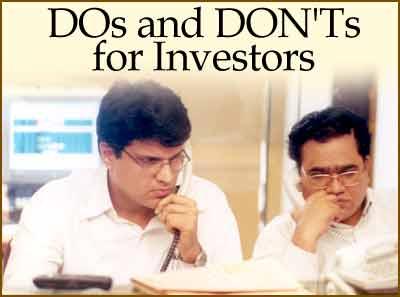
There are several reasons why small cap stocks should not be considered for investment by any investor - new or old, small or large. Before I start to argue my case, let me define what is a small cap stock.
The market capitalisation (or market 'cap') of a stock is the product of a stock's current market price and its equity capital. In other words, a stock having an equity capital of Rs 10 Million (1 Crore) and a price of Rs 100 has a market cap of Rs 1 Billion (100 Crore).
The question is: What market cap makes a company a small cap, or a mid cap or a large cap? The short answer is: It depends on whom you ask. There are no precise definitions. The industry norm for a small cap company seems to be a market cap of upto Rs 2500 Crore!
A mid cap company has market cap ranging from Rs 1000 Crore to Rs 13000 Crore. Large caps are those forming part of the Sensex 30 and Nifty 50 stocks. As you can see, the whole thing is pretty confusing.
Small investors get attracted to small caps because of two main reasons - 'affordability' and greed. Most small companies are also small cap companies that trade typically at few tens of Rupees. This price is attractive to small investors with small capital. (Many don't realise that a Rs 30 stock may have a Re 1 face value and may be trading at a P/E of 30.)
Many of today's large caps were small caps 10 or 12 years back. The general assumption is that all small caps have the potential to become large caps and give multibagger returns. But only a small minority out of the thousands traded in the stock market actually make the transition. Most will remain small caps, or disappear into the sunset.
Why are small cap stocks so risky that they are best avoided by small investors?
- lack of transparency of management
- lack of adequate research by fund houses and brokers
- lack of financial muscle
- low liquidity
- high volatility
Management is too busy trying to survive (or siphon off money) to look after investor relations and proper communication of plans. Fund houses shun such stocks, so analysts don't cover them or visit their factories to ask tough questions.
One or two bad quarters can wipe out a small company, who may not have access to big money. Low volume of trading leads to difficulty in getting in or out, and wild price swings if small quantities are traded.
Only those investors with adequate experience and knowledge of fundamental and technical analysis should attempt investing in small cap stocks. That too, with the awareness that the entire investment can go down the drain. Preferably, the investment in small cap stocks should be limited to 10% of total portfolio value, to mitigate the risks involved.
The vast majority of investors should look for more expensive but less risky large cap stocks, or stick to index funds or index ETFs. Always remember Warren Buffet's investment rule: Don't lose money.

No comments:
Post a Comment